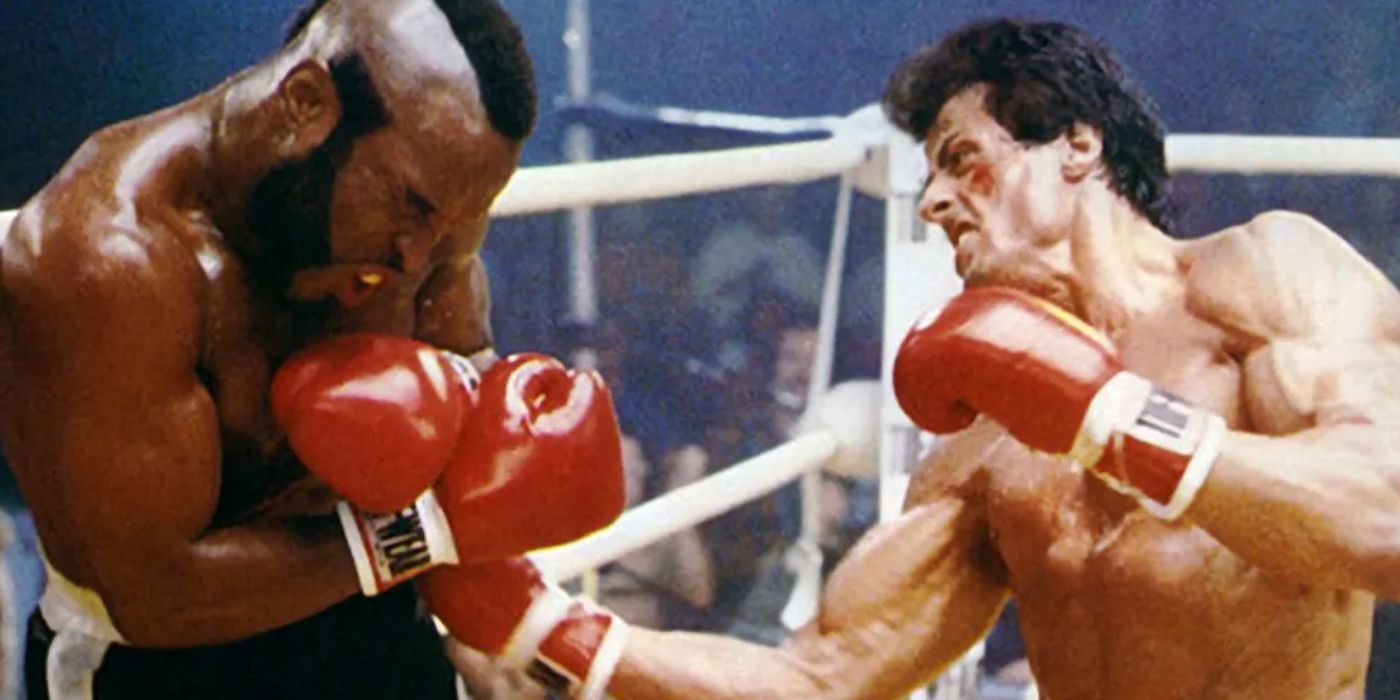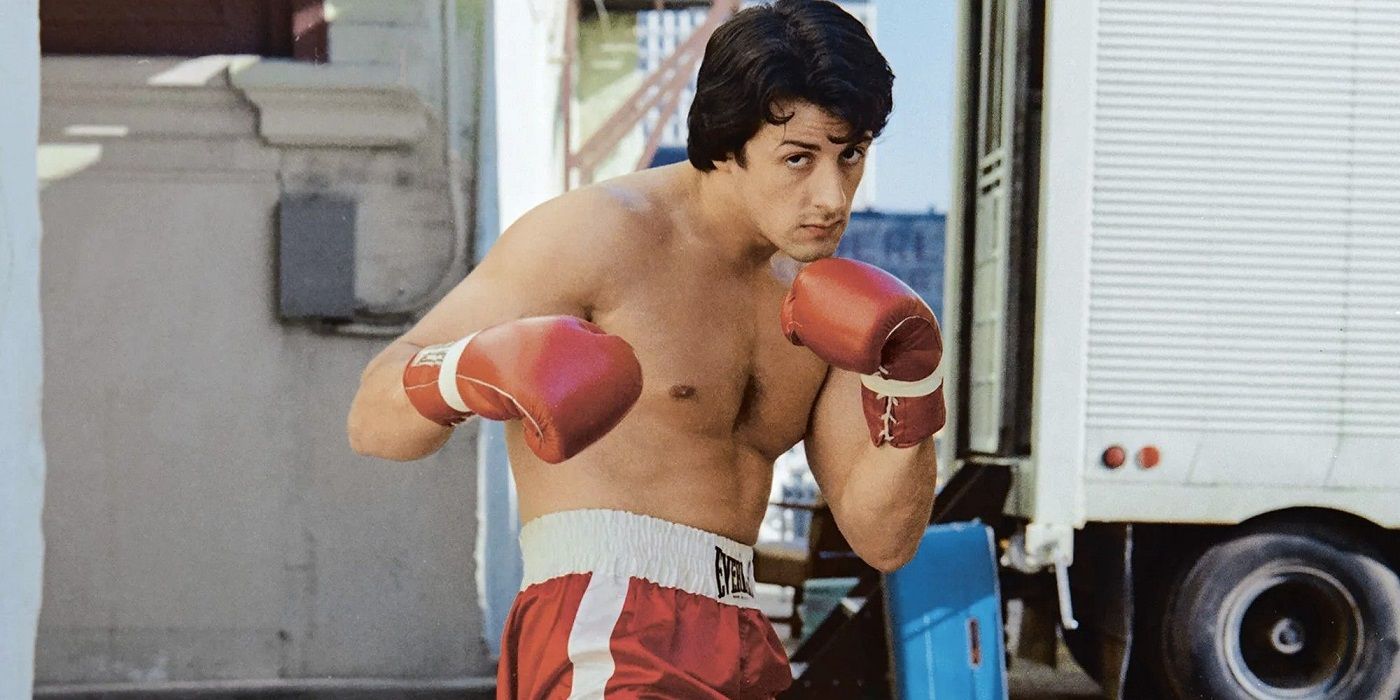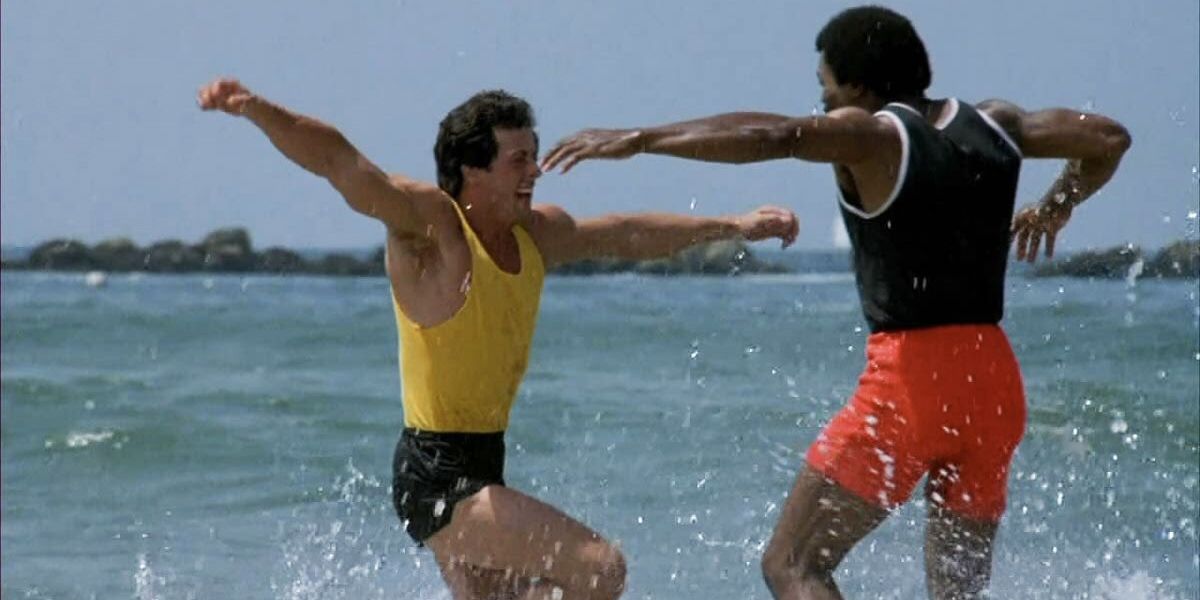Back in November, Sylvester Stallone gave an interview with the Hollywood Reporter, and discussed his exit from the Rocky/Creed franchise. While he discussed some of the reasons why he wouldn't come back for Creed III, one of them would be the franchise's shift in tone. "It was taken in a direction that is quite different than I would’ve taken it," Stallone said. "It’s a different philosophy — Irwin Winkler’s and Michael B. Jordan’s. I wish them well, but I’m much more of a sentimentalist. I like my heroes getting beat up, but I just don’t want them going into that dark space." It's worth noting the Rocky franchise has never had the same tone throughout its forty-year history. Starting with a more grounded approach, the franchise got sillier and flashier with each entry, with that evolution's point of origin being Rocky III.
The Rocky Franchise Starts Humble & Grounded
Rocky, written by and starring Stallone, was released in 1976, and became an American classic. It won three Academy Awards, including Best Picture, and turned Stallone into a household name. The backdrop of the story is set in the working-class area of Philadelphia where Rocky's best friend Paulie (Burt Young) works at the meat packing place and Adrian (Talia Shire), the love of Rocky's life, works at the pet store. Rocky himself is an average boxer who has a part-time gig as the muscle for a loan shark. In one scene, he goes to the docks on orders from his boss to break a debtor's thumbs for missing payment. While Rocky's nice guy nature doesn't allow him to do any harm, the film makes it clear that there were no other options for someone like Rocky in this environment. When Mickey, his trainer, chastises him for wasting his potential and working for a loan shark, Rocky replies, "It's a living." Rocky is not flashy or showy, but grounded in a working-class sensibility and show the rough circumstances that people find themselves in.
Rocky is never supposed to win. That's the core appeal of the film. He shouldn't win. It's all about Rocky going the distance and proving something to himself. "Nobody's ever gone the distance with Creed, and if I can go that distance, you see, and that bell rings, and I'm still standing', I'm gonna know for the first time in my life, see, that I weren't just another bum from the neighborhood," he tells Adrian. He's the Everyman. He's not the strongest or fastest, but audiences, for generations, can and have seen themselves as someone doing the best they can with what they have. Rocky goes from part-time small fighter enforcer to going round for round with the boxing heavyweight champion of the world, Apollo Creed. It's uplifting that he goes the distance, and at the same time, we have never taken out of the serious and down to earth world that these characters reside. That tone carries over in Rocky II, when even after he has gone the distance with Apollo, he still has to get a job at the meat packing place and later cleaning up at Mickey's gym. He ultimately defeats Apollo in the rematch, takes the title of heavyweight champion of the world, but only after going through the struggles of life post first-fight and Adrian's pregnancy complications. Once the franchise enters the 1980s, things change.
Rocky's New Life Leads to a New Tone
Rocky III asks an interesting question: "What happens when the ultimate underdog is no longer the underdog?" No longer is Rocky the small-time boxer he once was; he's now the defending heavyweight champion. No longer is he drinking raw eggs in his one-room apartment and running up the steps of a museum; He's rich and lives in a mansion with his family. However, that success comes with a price. After a public challenge for the title by boxer Clubber Lang, Micky tells Rocky: "The worst thing that happened to you, that can happen to any fighter: you got civilized." He's not the young guy he is in I and II, hungry for the chance to prove himself, but someone's who's living off the excess of wealth and fame. With this change in Rocky's life, comes a change in the tone of the film.
Gone is serious tone of I and II, but a more lighthearted and sillier vibe is welcomed. Within the first thirty minutes of the film is a wild, hilarious fight between Rocky and wrestler Thunderlips (Hulk Hogan). We see our hero defend himself against this giant who throws him around like a ragdoll in a charity match for ten minutes ("Why are they carrying him?" Paulie asks as Thunderlips enters the arena. "He's walking," Micky replies"). While films have had moments of light heartedness such as Rocky chasing chickens or when a little girl yells "screw you, creepo" to Rocky after walking her home, those scenes work to develop the characters. This is a more extended bit of levity for the audience.
Rocky III also lacks the well-rounded opponent such as Apollo (who takes on a mentor role in this film) with their own motivation for fighting. Instead, we get the introduction of Clubber Lang, an abrasive, loud, boxer brought to life by Mr. T. He is flashy, he's explosive and everything he says is through a scowl ("I'm going to torture him. I'm going to crucify him. Real bad"). He's more cartoon than man. More caricature than character. We've never given a reason as to why he fights, or any inner life had to add a dimension to him the same way with Apollo. With Apollo, he wanted to fight Rocky to put on an entertaining show for the public in I and then to save his boxing reputation in II. Clubber is nothing more than an obstacle for our hero to overcome. While there are serious, heavy moments in the film, such as the death of Mickey, Rocky III is a lot more of an 100-minute amusement ride to enjoy than the character explorations of I and II.
'Rocky IV' Ups the Ante on Zany
Rocky IV takes the lighthearted approach of III and cranks it up further with the introduction of one of the most iconic movie villains of the era: Dolph Lundgren's Ivan Drago. Drago is of the Clubber Lang ilk of opponents. He's not so much a man as he is a personification of a 1980s American idea of the Soviet Union: Cold, machine-like, cruel. We get nothing from him in terms of motivation, inner-life, or insight into who he is on a human level beyond his most iconic lines : "If he dies, he dies," and "I win for me! FOR ME!" Drago has no humanity (not until Creed II where there's insight into his life post-Rocky IV). Oh, and let's not forget the inclusion of Sico the Robot, a gift for Paulie on is birthday for which he uses it to get him beer and make jokes implying something untoward is occurring. " I'm gonna have her wires tied when I get back," Paulie says. While, its inclusion is because the real-life robot helps with children with autism, it's presence in the franchise could've only existed in a post-Rocky III world. In fact, if this film followed after II, it would be too jarring a shift for the audience. What bridges the gulf between the zany and the serious is Rocky III. Rocky III ran, so Rocky IV could run up the side of a mountain in Russia and scream "DRAGO, DRAGO, DRAGO."
While Rocky V attempted to go back to it's humble origins by having Rocky go back to the working-class neighborhood he had his start in (with bit of flash with the boxing promoter George Washington Duke character), as well as later additions in the franchise like Rocky Balboa and the Creed films having a more serious-tone but uplifting tone that matched the original film, those efforts didn't erase the effect Rocky III would have on the franchise. Outside the original, Rocky III and Rocky IV are the most memorable and iconic films of the franchise. While Creed III may change the tone of the films, it's actually just repeating history.



